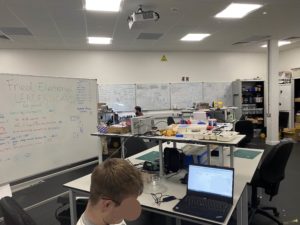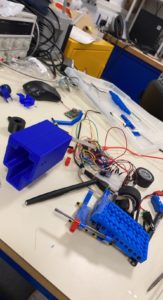A studio-based course is very different from the traditional lecture structure. It requires you to be in a large room with others, and even though you might have your own working space, everyone observes and comments on each other’s work, especially if you are working in teams. As much as this process is beneficial for idea flow, creativity and self-improvement, being formally or informally criticized for your work every day can be a daunting experience especially if you are an introvert or if you are just struggling with low self-confidence.
I am not a mental health professional, but I am here to share my experience and coping mechanisms, as I feel that I identify with those traits.
I study Integrated Design Engineering and for the past three semesters, my course has required a lot of studio-based modules (with some modifications last year due to COVID-19). The work we did was usually a mix of creative and practical work, and our studios had a mix of manual and power tools, along with 3D Printers. Being in my last semester of university, I have gathered some advice that I found useful to make me less anxious about working in a large space with others.
Create your own working hours (if possible)
It is important to work during the hours that you feel comfortable, as long as you complete your work. What I wish I had known, is that unless you have meetings or presentations at specific times, it is perfectly fine to come later or earlier than everyone else and leave when you decide. Just because the studio is available and open all day, does not mean you have to stay more hours than what you think is essential.
However, the fact that studios are (usually) accessible almost all day is very beneficial. What worked for me was showing up early (maybe before everyone else), when the studio was almost empty. That was ideal, as there were fewer people and it was easier to socialize and make friends, but also the 3D printers and tools were more available during off-peak hours which helped me get my work done faster.

Familiarise yourself with the space
If you have the chance, claim a working space. Consistency is key. You can familiarize yourself with the space and feel comfortable knowing that you can find your work as you left it the previous day. Another step towards familiarity is to pay attention to the course/studio induction and ask about all the available resources early on.
Picture this, I was already halfway through the project, and I saw people bringing out all sorts of materials from different parts of the studio. I was too shy to ask where they were getting them from, but I also wished that I knew about all the available resources earlier during prototyping. So be prepared, and ask supervisors questions as soon as you get the chance. Usually, supervisors have specific studio hours (unless there is a safety risk with the studio resources).

Start work early
Loosen up from that creative block and start work early! It helps to start with low fidelity prototypes/models and get as much feedback as you can early on to really give you the direction you require. My natural tendency is to quietly work on my part of the project and only show it to my group-mates and supervisor when it is complete and polished, but NO! I have found that little presentations of your work in progress to your group or your supervisor (as stressful as they may seem at the time) are the way to go and are, most of the time, encouraged by your syllabus as well.

I hope this gave you a clearer view of how to manage a studio-based course. Remember that everyone is anxious about putting their work on display, and you have to find the right people that give you honest constructive criticism while having your best interests at heart.
Respond